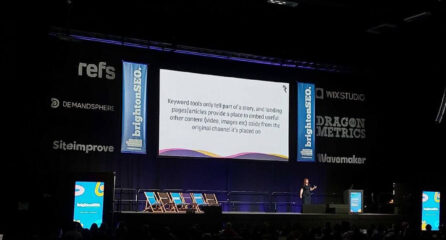Our recent article about Google’s search algorithm was written for many reasons, but one of the main reasons was to give CTOs, CMOs and developers enough knowledge of Google’s algorithm that they can spot major SEO misunderstandings.
The SEO industry, like any other, has a wide range of professionals within it. Some will stick exclusively to the facts, others will make an honest attempt to infer reasonable conclusions from those facts, and still others will plain make things up. When an SEO professional buying into SEO myths burns a client, the reputation of everyone in the industry is hurt.
While our search algorithm article forms a platform for understanding SEO in general, there’s always more work to do on this front. These pervasive myths about Google’s search product undermine confidence in the SEO industry, and should be debunked wherever they are found.
1. “Negative SEO Is Impossible”
Negative SEO (using deliberately poor SEO techniques to damage a competitor’s rankings, instead of optimising your own) is possible. There are several ways it can be accomplished, although for obvious reasons we won’t be going into any great detail on specific methods. You can exploit a site’s poor structure and existing poor SEO, you can use a click bot to exploit the way Google tries to improve the search experience with hard data, or you can go old school and build terrible links from horrible, spammy or hacked sites to your target.
Claiming that negative SEO is impossible is potentially harmful, as it can lead to sites being left with significant vulnerabilities that should be fixed. It’s not just negative SEO attacks that can hurt sites with these vulnerabilities, either – there’s always the possibility that they’ll come back to bite the developer at a later date.
2. “Negative SEO Is Everywhere”
Negative SEO is possible, but it’s pretty rare. In almost all cases it is not worth the investment of time, money, programming skill and risk that it takes to create a negative SEO campaign. The websites that are most vulnerable to negative SEO are already borderline – the worse your SEO practices are, and the more spammy practices your industry takes part in as a whole, the more vulnerable you should be to negative SEO.
Realistically, we’re looking at a few middlemen for a few niche industries being at risk from negative SEO from their direct competitors. We would be surprised to hear of such an attack perpetrated by a company with more than, say, five employees, as the reputation damage would be too great if word spread (and word would spread quickly). It’s not technical limitations that limit the usage of negative SEO, but social and economic considerations.
Most cases of alleged negative SEO fall into a few categories, from most common to least:
- An algorithm update or refresh seriously damaged the site’s rankings.
- Google has only just spotted bad practices by a previous SEO.
- Genuine criminals are using excerpts from your site to make their dodgy credit-card-details-harvesting scheme look legit.
The third is bad luck, the rest are much more likely than the prospect of negative SEO attacks. Even the third option, as rare as it is, is more common than an actual negative SEO attack.
3. “SEO Is About Optimising For A Particular Metric”
This is one of the most potentially damaging myths regarding SEO that is still circulating. If you’re still optimising for keyword density, or PageRank or Domain Authority, that is a good way to build unnatural copy or an unnatural link profile that gets your website penalised by Google – but this holds true even for more modern SEO metrics.
For example, it is now considered to be fairly uncontroversial that page load speed has a positive impact on your position in the rankings, especially on mobile. However, optimising page load speed past a certain point at the cost of user experience is more likely to damage your rankings than improve them.
At a certain point, you have to forget about the metrics and optimise for the user. We don’t write articles containing original research, plenty of images and new interactive content and think “This is really going to impress Google’s algorithm”, after all.
One of our favourite quotes about SEO came from a user on Hacker News, who said it was “doing the right things for the wrong reasons”. It’s funny, pithy and true to an extent – but if you do things for the wrong reasons for too long or too self-consciously, you will lose sight of the target, trip yourself up, and shoot yourself in the foot.
4. “More Links Out Are Always Worse”
If your webpage has many links out to reputable resources, it’s a mark of a good quality website.
In general, websites are clustered together in rough terms of likeness, subject matter, quality and so on. Building stronger links with a particular community or tying yourself to a particular level of resource is likely to positively impact your ranking.
Good targets for positive external linking include patents and whitepapers, known authority figures, and industry leaders who don’t directly compete with you. You should be linking to these sites anyway, as it produces a better user experience. When we read good resources but they don’t link to the sources they’ve obviously paraphrased, we don’t tend to return to that site, as it’s a fairly cynical (and counter-productive) tactic.
5. “The End Goal Is Ranking Number One”
Ranking number one is useless if your copy has been manipulated to generate an artificial, SEO-friendly lexicon. SEO-manipulated copy tends to lie somewhere within the literary equivalent of the “uncanny valley”, meaning that no-one who visits such a site ever actually converts. Organic traffic isn’t the ultimate goal for most business models, conversions are.
When the final goal is traffic that converts and branding that appeals to your customers, that typically means ranking solidly for a long period of time rather than seeking high-volume, overly-general traffic from ranking number one for broad keyphrases.
The most common way SEO rebounds and hurts small business owners is when the runaway pursuit of big numbers for generic keyphrases detracts from the overall marketing push of the company.
…And The Rest
There are many more SEO myths than these five, but these are the ones we think are, in a general sense, the most widespread.
If you’re frustrated with a particular SEO myth or meme, let us know in the comments below! We love discussion, and too often in the SEO community, this is shut down by a cozy consensus.
If you want to discuss how SEO fits with your overall Online Marketing strategy, give us a call or leave us a message.




